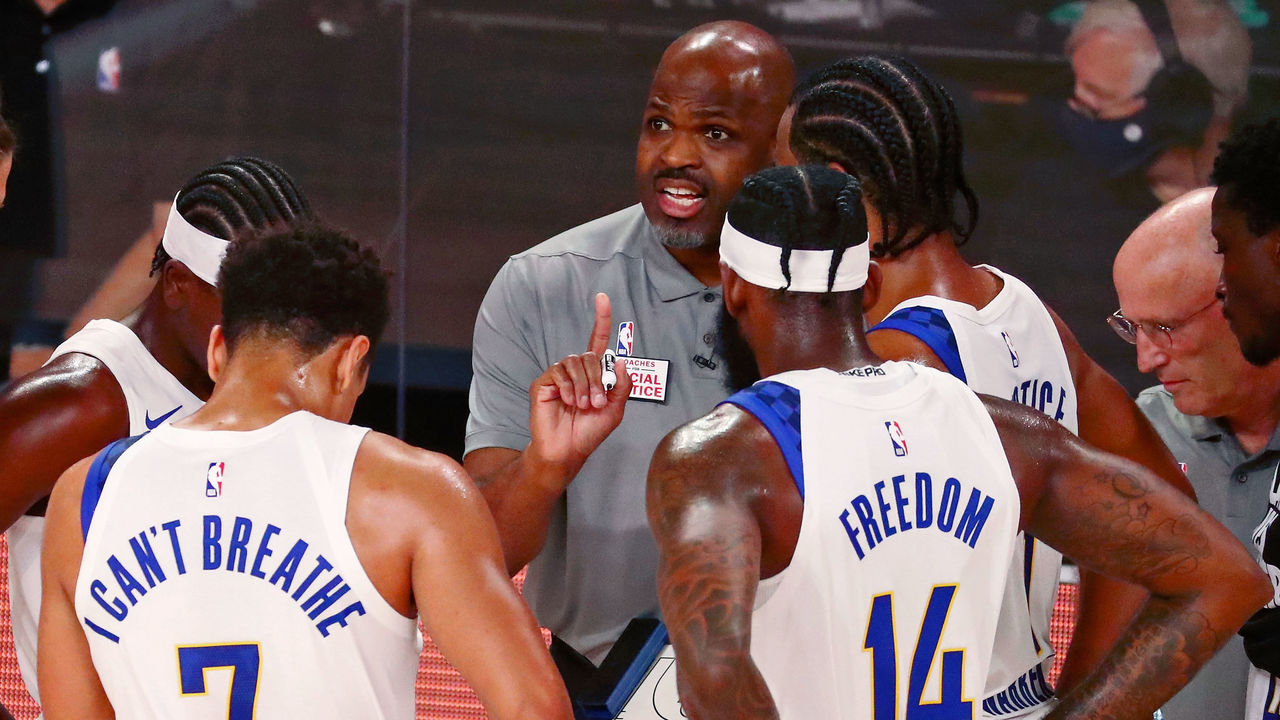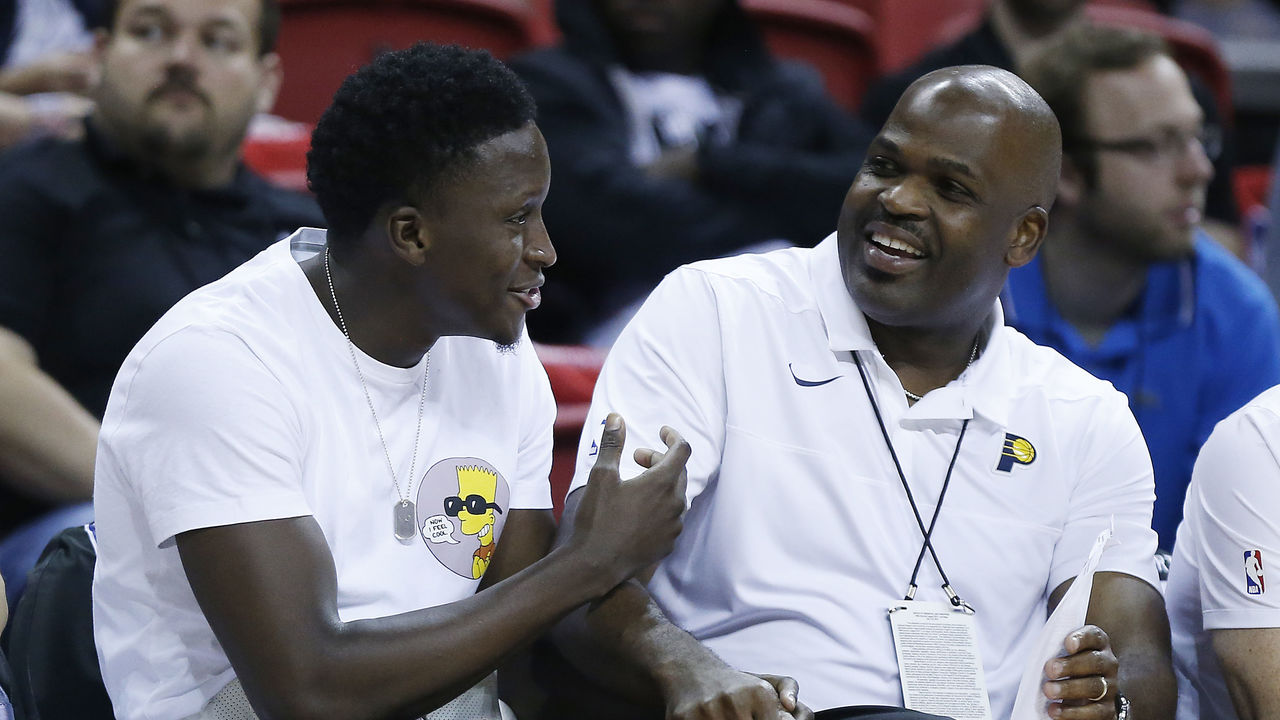Nate McMillan was a victim of Pacers' injuries, and his own success
Nate McMillan is far from a perfect coach.
When the Indiana Pacers decided to fire him Wednesday, he was a day removed from overseeing a first-round sweep for the third time in the last four years. The Pacers were at a significant talent disadvantage in each of those matchups, and dealt with significant injury absences in the last two, but it's still understandable Indiana's front office would be disappointed by the fact the series weren't even competitive.
McMillan wasn't always proactive when it came to making game-to-game or quarter-to-quarter adjustments. The team's crunch-time execution, particularly in its most recent sweep at the hands of the Miami Heat, was plagued by disorganization, miscommunication, and a penchant for iso-ball.
McMillan's offenses in Indiana were, on the whole, pretty vanilla. His Pacers played a lot of methodical, station-to-station basketball, with rote sets and a shot profile that consistently lagged behind the times. McMillan's teams have almost always played slow, going back to his years in Portland, and the Pacers have ranked in the bottom 10 in pace for three years running. They ranked dead last in the NBA in both 3-point attempt rate and free-throw attempt rate this year. They ranked no higher than 23rd in either category in any of the last three seasons. The team hasn't lacked for good shooters, either; it's just that those shooters have subsisted mostly on jumpers inside the arc. Indiana ranked in the top three in long-mid-range attempt rate every year of McMillan's tenure.
All that said, McMillan's been a stabilizing force for the Pacers, and the decision to cut bait is a bit puzzling, especially in light of the fact the front office extended his contract (albeit only by one season) two weeks ago. It's worth noting that McMillan's deal was set to expire June 31, so some renegotiation was required for him to even coach the Pacers in the bubble. And if firing him was the plan all along, the extra year of salary is a nice parting gift. But if his job status was contingent on the team's playoff result, it's fair to ask what the expectations of McMillan realistically should have been, and what a different coach could've done in his place with the same roster.

The organization made its motives for the firing patently clear when it needlessly included McMillan's playoff coaching record (3-16 in Indiana, 17-36 lifetime) in its statement announcing the decision. What that statement omitted is the fact McMillan was without his best player in each of the last two postseason series.
Victor Oladipo was the Pacers' unquestioned alpha and far and away their best off-the-dribble creator in 2018-19, and his absence in the playoffs left them with no means of initiating efficient offense against the Celtics. This year, Domantas Sabonis was the team's lone All-Star and its offensive fulcrum, and without him the team had no connector to facilitate side-to-side action, nor a post presence to punish the small end of Miami's switches.
The statement also failed to mention that after one year at the helm, McMillan's best player asked out, and he had to shepherd the team through the Paul George trade. Instead of the regression most people expected, the Pacers improved significantly, as Oladipo - the centerpiece of Indiana's return in the deal - blossomed into an All-NBAer and All-Defensive first teamer. That 2017-18 team came within a hair's breadth of knocking off LeBron James and the eventual Eastern Conference champion Cleveland Cavaliers in the first round of the playoffs.
Last season, rather than plateau or regress after their unexpected success, the Pacers got better, ranking third in the NBA in defensive efficiency and sitting just two games back of the No. 1 seed in the East before they lost Oladipo to a ruptured quad tendon. That injury rerouted Indiana's direction and reoriented its priorities, with the offseason bringing significant change. Out went Bojan Bogdanovic, Thaddeus Young, Darren Collison, and Cory Joseph - a quartet that represented four of the team's top five minutes-getters from the 2018-19 season. In to replace them came Malcolm Brogdon, Jeremy Lamb, T.J. Warren, and T.J. McConnell.
With Oladipo set to miss a huge chunk of the 2019-20 season, and the team's offense having flatlined in his absence, the overhaul was a worthwhile gambit to add more shot creation. But the Pacers were losing a ton of institutional knowledge, and the moves seemed particularly likely to hurt them at the defensive end, where Young and Joseph had been huge contributors and Bogdanovic had made tremendous strides. Additionally, with Young gone, Sabonis - who'd thrived primarily as a center since arriving in the George trade - was shoehorned into a role as the starting 4 alongside Myles Turner, a twin-big look that had never been especially successful. Once again, McMillan would have to navigate a completely refashioned roster.
And once again, the Pacers managed to improve, posting their best winning percentage of McMillan's tenure even though Oladipo spent the first three months of the season out and returned looking like a husk of his pre-injury self. The team again crafted an elite defense, ranking sixth in the league in points allowed per 100 possessions, as Warren submitted a season that likely would've earned him Most Improved Defensive Player of the Year honors if such an award existed. For all the legitimate gripes about the Pacers' ho-hum offense, McMillan always squeezed the absolute most out of them at the other end of the floor. They were always prepared, and always played extremely hard.

Ultimately, that wasn't enough to offset injuries and a meager 103.9 offensive rating against the Heat. On top of losing Sabonis, the Pacers were without Lamb, a 6-foot-8 wing who provided an element of tertiary scoring and lineup flexibility that they couldn't replace. Oladipo played, but he was nowhere near the force he'd been when last seen healthy. He struggled with his jump shot, lacked his previous explosiveness getting to the rim, and seemed at points to completely lose the feel for his handle.
After a remarkable scoring boom during the seeding stage, Warren struggled to shake loose as a No. 1 option against a team with an army of long, physical wing defenders geared towards slowing him down. Having never occupied that primary role before, he lacked the playmaking chops to use the Heat's extra defensive attention against them. Having Sabonis around to serve as a screener, pick-and-roll release valve, and secondary playmaker certainly would've helped.
As in past years, it was the flaws in Indiana's roster, more than those in McMillan's coaching, that were exposed in the postseason. If anything, he was a victim of his own success. The extent to which he coached the Pacers up in the regular season created playoff expectations that those teams were not equipped to satisfy, particularly in their shorthanded state. According to Chris Herring of FiveThirtyEight, the Pacers outperformed their preseason win-loss estimate (based on that site's projection model) by at least five wins every year McMillan was in charge. The last time they weren't cripplingly injured in the playoffs, they pushed the eventual East champs to seven games.
From Oladipo's breakout, to the massive defensive leaps Bogdanovic and Warren made, to the complete reinvention of Sabonis' game after he came over in the George trade, to Brogdon's successful first stint as a primary initiator, you'd be hard-pressed to find a player who didn't improve under McMillan's watch in Indiana.
For his part, the coach didn't make any excuses for himself.
"I take responsibility for this in the sense that no matter what happens under your watch, if it happens under your watch, then it's on you," McMillan told The Athletic's Bob Kravitz. "Regardless of whether you have injuries or not, the bottom line is, it's under your watch. The only reason I signed the extension is I thought I would have a chance to have a healthy team next season, but I had no plans of signing an extension until after the playoffs because if I didn't get out of the first round with this team this season, I thought it might be time for someone else to have an opportunity to do it."
Even with McMillan himself acknowledging that another first-round letdown was justification enough for the front office to go in a different direction, it's hard not to feel like he earned a chance to see how far he could take a healthy version of this team.
His successor should be grateful for the foundation he helped put in place.